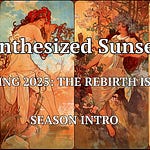This week we spoke with long time Science Fiction reviewer and anthologist Rich Horton. We talked about his experience in the early internet sci-fi community on Usenet, his career in sci-fi criticism at Tangent and Locus, his work creating sci-fi/fantasy best of the year anthologies, our thoughts on the current slate of Hugo Award nominees, and more.
We hope you enjoy!
TIMESTAMPS:
0:14 - Introduction
0:39 - What drew you to Substack?
1:33 - Rich Horton started Substack by reading people already here (Ted Gioia, Lincoln Michel, Naomi Kanakia)
2:25 - Usenet as a hub for sci-fi discourse
6:07 - Substack is a place where you can talk about books
7:07 - Stories about sci-fi discussion on Usenet
13:08 - Starting Writing Reviews for Tangent
18:19 - Becoming a columnist at Locus
21:13 - Creating SFF best of the year anthologies
25:49 - It was cool to publish stories from literary writers in sci-fi anthologies
28:38 - The challenge of only writing positive reviews
29:57 - It's hard to write negative reviews for people you know
32:32 - Should you be able to spoil a story as the critic?
33:40 - It's easier to write bad reviews for already well-aclaimed books
38:18 - Society doesn't have much respect for critics
39:55 - Newspaper book reviews are dying off
41:18 - The best critics are worth reading even outside of any engagement with the original text
44:57 - Rating books by entertainment and ambition
45:40 - Discussing Hugo Award Nominee Novels
48:54 - Having separate literary and speculative ratings
52:04 - A lot of "hard" science fiction is written by people with an actual background in science
56:13 - Experiences at WorldCon and other sci-fi conventions
1:04:13 - Conclusion and short fiction recommendations of short story The River Has Roots by Amal El-Mohtar and novella New Light On the Drake Equation by Ian R. MacLeod
1:06:22 - Start of Synthesized Sunsets Backstage
1:07:32 - It was cool to learn about early sci-fi internet with Usenet
1:08:22 - A higher barrier to engagement can create better conversations
1:10:42 - Discussing Hugo Awards Review #3: The Tainted Cup + A Sorceress Comes to Call
1:11:08 - We both liked The Tainted Cup a lot
1:13:09 - The Tainted Cup had a somewhat unambitious style
1:16:20 - The Ana + Din scenes in The Tainted Cup remind Kevin of ASMR videos
1:17:29 - Neither of us liked A Sorceress Comes To Call
1:17:55 - A Sorceress Comes to Call would be a pretty good kids book
1:19:27 - It's hard to separate personal opinion from objective quality when reviewing something
1:20:48 - It's important to believe in a character's existence
1:25:57 - Knowledge of the artist's vision can enhance the enjoyment of some art object
1:27:19 - "Earlier in my life I was unable to connect with the art objects of music" (songs)
1:28:28 - Discussing The SFF Magazine Canon
1:29:27 - The line between prozines and semiprozines is quite blurry
1:33:26 - Magazine recommendations
Reactor has longer form stories and is the most approachable as a sci-fi novel reader
Lightspeed has the widest variety of sci-fi stories
Beneath Ceaseless Skies has the most consistent style of secondary world fantasy stories
1:36:59 - Conclusion and short story recommendation of “The Electric Ant” by Philip K. Dick














Share this post